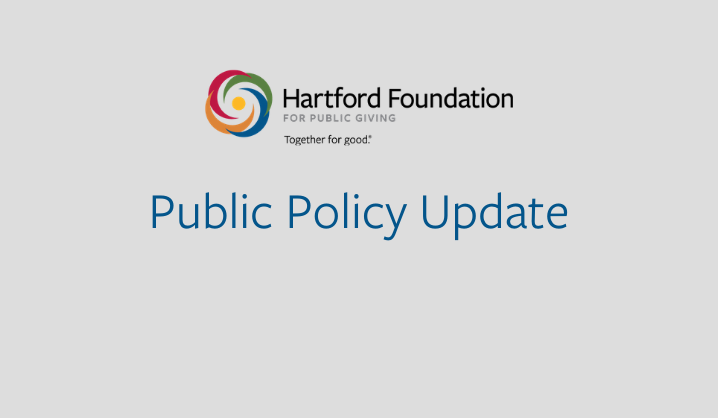New & Noteworthy

Hartford Foundation Submits Testimony in Support of "Clean Slate" Legislation to Support Previously Incarcerated Residents Successful Reentry into the Community
Read the Foundation's Testimony
On Wednesday, March 10, the Hartford Foundation submitted written testimony to the legislature’s Judiciary Committee in support of Senate Bill 1019, An Act Concerning the Board of Pardons and Paroles, Erasure of Criminal Records for Certain Misdemeanor and Felony Offenses, Prohibiting Discrimination Based on Erased Criminal History Record Information and Concerning the Recommendations of the Connecticut Sentencing Commission with Respect to Misdemeanor Sentences.
The Hartford Foundation has funded critical reentry supports to help returning citizens succeed, including pre employment training and job placement assistance offered through the BEST Chance Program and the Reentry Welcome Center in Hartford, which provides individuals with access to basic services and referrals to programs.
This work has contributed to our efforts to increase stable employment opportunities for adults and youth in region facing barriers to employment. Our employment-related investments include a focus on increasing hiring and retention of residents with significant barriers to employment, including returning citizens and opportunity youth disconnected from school and work.
The Foundation is committed to assessing what works and funded an evaluation of the first year of the Reentry Welcome Center’s operation that included focus groups of participants in the program. The assessment found that this collaboration is an effective means to ensure that returning citizens are immediately connected to the supports and services that can enable a successful reintegration into the community. The evaluation also revealed the need for additional work and policy changes to provide greater access to vital services such as housing and mental and physical health supports.
Our investments in supporting returning citizens have reinforced the need to acknowledge that the stigma of incarceration undermines the ability of returning citizens to secure housing employment, and other basic needs essential for successful reentry into the community.
The Hartford Foundation supports Senate Bill 1019 and other efforts to decrease the stigma and remove barriers to securing basic resources essential to rebuilding their lives that many individuals with criminal records face long after completing their sentences.
In 2018, Foundation staff participated in a broad, multisector Reentry Working Group that explored barriers Connecticut residents experience as they return to their communities after incarceration. The working group submitted a report, Hope for Success: Coming Home, which included input from stakeholders and experts in the field and focused on the need for Connecticut to strengthen anti-discrimination laws and remove barriers for individuals with a criminal record. Removing past criminal records is a thoughtful solution to ensure that returning citizens, who do not reoffend after release after an appropriate time period, get the second chances they deserve. The Foundation also supports the bill’s prohibition of discrimination against people with an erased criminal record in employment, housing, licensing, state benefits, education, some financial products, and public accommodations. The Voices of Justice Symposium in February 2020, which we supported, similarly brought together the voices of government policy makers and retuning citizens to inform clean slate and other policy proposals.
With respect to the specific length or mechanism of the criminal lookback period, we will defer to the expertise of this committee, the Department of Correction, and advocates, including citizens who have lived the longstanding challenges of making a successful transition from prison to the community. We also encourage consultation of the best available research on approaches to supporting declines in recidivism over time after release. The Hartford Foundation supports the purpose of these proposals and urges the committee to embrace efforts to help ensure the success of returning citizens.
The Foundation also endorses the bill’s creation of a formal annual training program regarding collateral consequences of a criminal record for members of the Board of Pardons and Paroles. Learning about the collateral consequences of a criminal record from individuals with lived experience would be invaluable in providing board members with more information about the consequences of their decisions.
In addition, the Foundation strongly supports Senate Bill 1019’s inclusion of an appointment of a deputy warden to serve as director of reentry services. We all recognize that much more needs to be done to provide additional pre-release planning to connect returning citizens to vital services, including stable and secure housing, mental and physical health care treatment, and access to job training and employment opportunities. The Department of Correction has made great strides in supporting individuals and their families prior to release and having a senior DOC official direct this work could support advancing those efforts.
The Foundation also endorses the legislation’s creation of a reentry employment advisory committee to support the alignment of education and job training programs offered by the Department of Correction with the needs of employers in the community. Through our own work in BEST Chance and efforts to create career pathways that integrate education and job training, we know it is vital to develop programs that engage employers as well as participants to inform the training so graduates have the skills that employers need.
